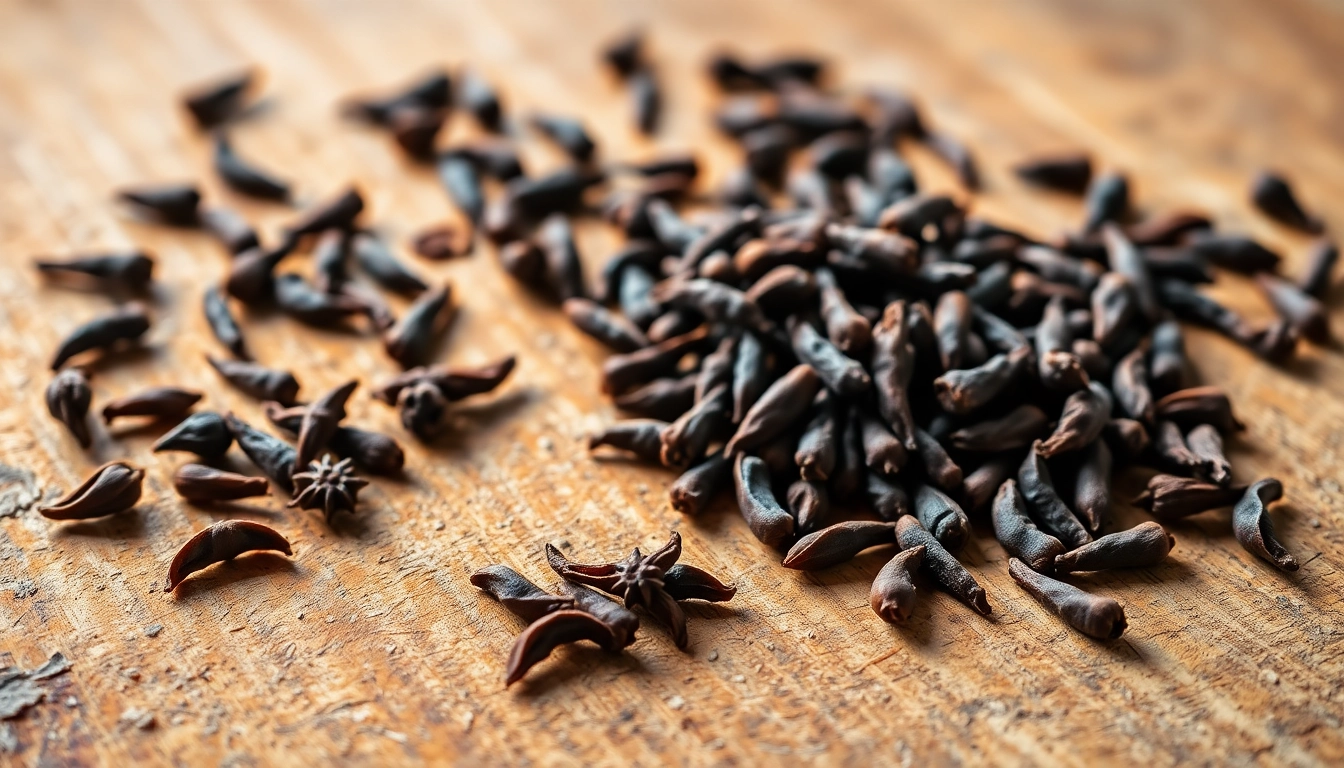The Origin and Types of Cloves
Understanding the Botany of Cloves
Cloves are the aromatic flower buds of Syzygium aromaticum, a tropical evergreen tree belonging to the Myrtaceae family. This notable species is indigenous to the Maluku Islands, commonly known as the Spice Islands of Indonesia. Cloves are distinct for their unique shape, resembling small nails, and their deep reddish-brown color upon drying. Highly aromatic, they are utilized not only in cooking but also in traditional medicine and various consumer products ranging from cosmetics to dental care. The essential oils extracted from cloves are particularly valued for their therapeutic properties.
Different Varieties of Cloves
There are mainly two varieties of cloves that are recognized widely: the Indonesian clove (*Syzygium aromaticum*) and the Zanzibar or clove trees found primarily in Tanzania. Each type varies slightly in taste profile, with Indonesian cloves being more pungent and prominent in flavor. The quality of these crops depends on several factors, including geographical conditions, climate, and soil composition. Cloves, especially those harvested from organic farms, tend to fetch higher prices due to their enhanced flavor and aroma.
The Growing Process of Clove Trees
Clove trees require a humid and tropical climate to thrive, ideally growing between latitudes 10° north and 10° south. The growth process begins with seedlings that are nurtured for approximately six months before being transplanted to their permanent locations. These trees can take up to five to seven years to mature and bear flowers, which are harvested when they are still unopened buds. Maintaining the tree’s health during this growth phase is crucial, employing techniques such as irrigation, fertilization, and pest management. Farmers often resort to sustainable practices to ensure that clove production does not harm the environment.
Nutritional Profile of Cloves
Vitamins and Minerals in Cloves
Cloves are more than just a culinary ingredient; they are packed with vital nutrients. A single teaspoon of ground cloves contains approximately 7.98 grams of total carbohydrates, 2.38 grams of fiber, and is a rich source of manganese, a mineral essential for bone health, metabolism, and antioxidant support. Cloves also contain trace amounts of vitamins like vitamin K, which is important for blood clotting and bone metabolism, and vitamin E, which serves as an antioxidant protecting cells from damage.
Antioxidants Found in Cloves
One of the standout features of cloves is their high antioxidant content. Cloves contain compounds like eugenol, which not only contribute to their distinct flavor but also offer numerous health benefits. Antioxidants protect the body from oxidative stress caused by free radicals, reducing the risk of chronic diseases. Research highlights that cloves rank high on the ORAC (Oxygen Radical Absorbance Capacity) scale, showcasing their remarkable ability to combat oxidative damage.
Calories and Nutritional Density of Cloves
Calorically, cloves are relatively low, with a tablespoon containing approximately 21 calories, making them an excellent addition to various dishes without significantly altering caloric intake. Their dense nutritional profile offers a range of vitamins and minerals while being exceptionally low in fat, addressing dietary needs for health-conscious individuals.
Health Benefits of Cloves
Promoting Digestive Health with Cloves
Cloves have been traditionally used to support digestive health. They contain compounds that promote the secretion of digestive enzymes, aiding in the breakdown of nutrients. Additionally, cloves may alleviate symptoms of indigestion, bloating, and gas. A study published in the “International Journal of Nutrition” also highlighted cloves’ potential to mitigate stomach ulcers by reducing inflammation and irritation.
Cloves and Their Role in Pain Relief
The analgesic properties of cloves, primarily attributed to eugenol, make them effective for pain relief. Concoctions containing clove oil are widely used in dental practices to relieve toothaches and other dental discomforts. Furthermore, cloves may provide relief for conditions like arthritis and muscle pain, as their anti-inflammatory properties can help reduce swelling and pain.
Supporting Immune Health with Cloves
Due to their high antioxidant content, cloves play a crucial role in bolstering the immune system. Compounds like eugenol and other phytochemicals may enhance the body’s immune responses, aiding in the battle against infections. Moreover, cloves possess antimicrobial properties, making them an effective agent against various pathogens.
Culinary Uses of Cloves
Integrating Cloves into Recipes
Cloves can be incorporated in various culinary creations, lending their spicy, warm flavor to both sweet and savory dishes. They are a staple in spice blends such as garam masala and are often used in baking, especially during the holiday season, in cookies, cakes, and such traditional dishes as gingerbread and pumpkin pie. Cloves blend harmoniously with meats, enhancing flavor in dishes such as braised beef and roasted lamb. For those wishing to incorporate cloves into their cuisine, beginning with whole cloves in warm beverages like chai can showcase their aromatic profile.
Pairing Cloves with Other Flavors
Cloves impart a strong flavor, allowing them to pair excellently with various ingredients. They can be paired with cinnamon, nutmeg, and allspice to enhance sweet dishes or combined with savory spices such as cumin and coriander in spices blends for meat dishes. Fruits like apples and pears also pair well with cloves, making them ideal for compotes and jams. Combining cloves with citrus can create harmonious flavors, balancing sweet and tart notes in recipes.
Cloves in Seasonal and Festive Dishes
Cloves are a hallmark of winter cuisine, making frequent appearances in holiday recipes. Their rich aroma and flavor evoke warm, festive reminiscences, making them a key ingredient in mulled wines and ciders along with star anise and cinnamon. Additionally, they are vital in many traditional feasts, from spiced meats to desserts, creating that signature warmth that defines festive gatherings.
Purchasing and Storing Cloves
What to Look for When Buying Cloves
When purchasing cloves, it’s crucial to consider quality. Opt for whole cloves over pre-ground ones, as they retain flavor and aroma longer. High-quality cloves will have a rich fragrance and be uniform in color. It’s recommended to purchase cloves from reputable suppliers and check for organic certifications, ensuring they are free from harmful pesticides and chemicals. Whole cloves should be firm and have a strong aroma when crushed between fingers.
Optimal Storage Techniques for Freshness
To prolong the shelf life of cloves, store them in an airtight container away from light, heat, and moisture. Whole cloves can last for up to three years when stored properly, while ground cloves have a shorter shelf life of about 6-12 months. Keeping cloves in a cool, dark place such as a pantry or spice cabinet will ensure they retain their potency and flavor.
Using Cloves: Whole vs. Ground
Deciding whether to use whole or ground cloves often depends on the recipe and desired flavor intensity. Whole cloves are often used in recipes that require long cooking times, as they release their flavor gradually, while ground cloves offer a more immediate flavor impact in baked goods. It’s important to note that ground cloves are significantly stronger than whole cloves, so adjusting quantities accordingly in recipes is recommended.










Leave a Reply